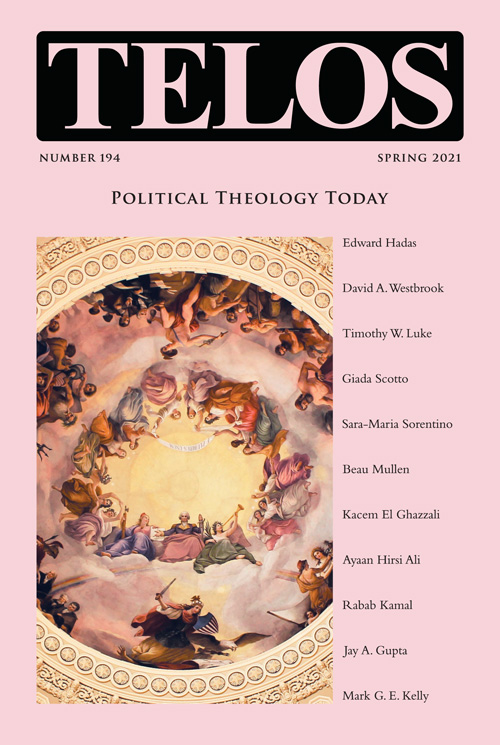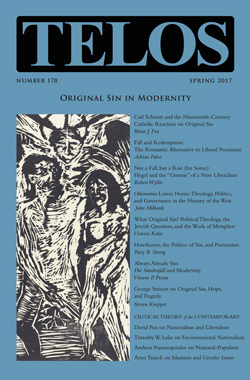In today’s episode of the Telos Press Podcast, David Pan talks with Matthew Dal Santo about his article “Russia, the Ukraine War, and the West’s Empire of Secularization,” from Telos 201 (Winter 2022). An excerpt of the article appears here. In their conversation they discuss Augusto Del Noce’s view of twentieth-century secularization as the unfolding of the philosophy of atheism; how Del Noce understood secularization; why, if Marxism is atheistic, Del Noce sees the West as more atheistic than the Soviet Union; why the alliance between the United States and Ukraine is a secularist one; why it is necessary to link religion and politics to avoid secularization; how the idea of the Holy Rus’ presents a politics that realizes a religious project rather than one that replaces a religious project with a nationalist political one, and how we might differentiate between the two possibilities; the distinction between the causality of (or immediate reasons for) the war in Ukraine and its meaning (or higher causality); and how to make sense of a contradiction between the two in the case of the Russian invasion of Ukraine. If your university has an online subscription to Telos, you can read the full article at the Telos Online website. For non-subscribers, learn how your university can begin a subscription to Telos at our library recommendation page. Print copies of Telos 201 are available for purchase in our online store.
|
Telos 194 (Spring 2021): Political Theology Today is now available for purchase in our store. Individual subscriptions to Telos are also available in both print and online formats.
This essay appeared in Le Figaro on December 8, 2020, and this translation by Russell A. Berman is published with permission of the author. Hyperlinks are from the original, while footnotes have been added by the translator. Translator’s comments are here. In the face of a very real Islamist threat that has led to violence and which the proposed law on “separatism” attempts to address, it is interesting to try to raise the level of the debate. It is necessary to inquire calmly into a question that worries those thinkers least inclined to emotional reactions. In contrast to a Christianity drained of its former ambitions, why is it that Islam has not given up its virulent proselytism and instead appears to pose a threat for the future? This is a threat that de Gaulle already recognized in one of his extraordinary communications to Alain Peyrefitte, when he declared: “We are after all a European people of the white race, Greco-Latin culture, and the Christian religion.” And he considered Algerian independence necessary to prevent his village from being one day renamed “Colombey-the-two-Mosques”—which does not at all mean that he intended to exclude other “races” or religions. He understood France too well to endorse a narrow or xenophobic vision of it. Jean-Marie Rouart, a prolific French author and, since 1997, a member of the French Academy, published “Secularism is an Illusory Defense against the Islamist Will to Conquer,” in Le Figaro on December 8 and available in English translation here with the author’s permission. While the essay’s starting point is the challenge of Islamism in France and the efforts by the Macron government to address it, it explores a much wider matrix that includes the historical process of secularism, the status of Christianity in France (and, by extension, in the West more broadly), the role of tradition in national identity, and the imperative of the sacred in any culture. This complex array of ideas has implications far beyond France, yet it also indicates how today’s France has become ground zero for the cultural conflicts around secularization, Christianity, and Islam. To understand Rouart’s argument, one needs first to consider this specific context. What makes this topic urgent now? The ongoing Sudanese revolution has emerged at a time when most of us had already given up any realistic hope for what has become known as the Arab Spring. Yet, if anything, the revolutionaries in Sudan have the best chance yet of simultaneously defeating both nationalist dictatorship and religious fundamentalism. This would be no small feat; it would arguably mark the most significant historical turning point in the struggle for democracy in the Middle East and North Africa (MENA) since World War II. Since the protests began in Tunisia in late 2010, the Arab Spring has repeatedly failed to deliver on its promise of democratic governance. I argue that this is primarily because the protest movements have simply not been revolutionary enough to break free from the dominating orbit of the retroactive forces of nationalist dictatorships and religious fundamentalism. Under these circumstances, the non-violent, mostly liberal movements were quickly neutralized, demonstrating the degree to which the death of the Left has left contemporary societies at the mercy of fascist forces. Telos 178 (Spring 2017) is now available for purchase in our store. |
||||
|
Telos Press Publishing · PO Box 811 · Candor, NY 13743 · Phone: 212-228-6479 Privacy Policy · Data Protection Copyright © 2025 Telos Press Publishing · All Rights Reserved |
||||




